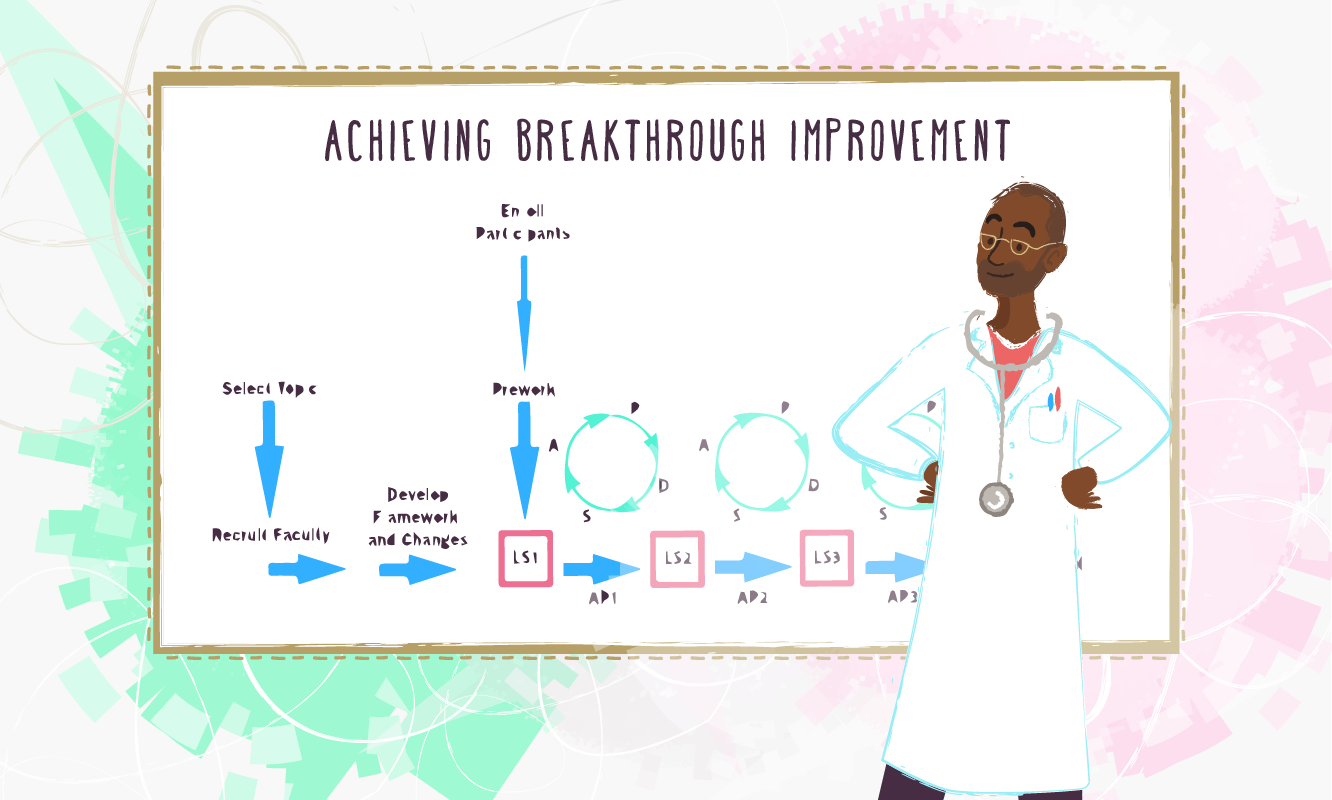Start improving with Life QI today
Full access to all Life QI features and a support team excited to help you. Quality improvement has never been easier.

Organisation already using Life QI?
Sign-up

Published on 30 September 2020 at 22:07

We’ve talked about Improvement Collaboratives and looked at how they can help drive transformational change in patient safety and quality improvement. In this article, we’ll be looking in more depth at the Institute for Healthcare Improvement’s (IHI) Breakthrough Series Collaborative model, which was first launched in the mid-1990s and has been supporting improvements in health care quality ever since.
Learning within a collaborative is thought to be one of the most successful methods that leads to quality improvement and system wide change - and the Breakthrough Series Collaborative model is one of these models. Described by the IHI as a ‘Collaborative Model for Achieving Breakthrough Improvement,’ the Breakthrough Series has been designed to help organisations by creating a structure in which interested parties can easily learn from each other and from recognized experts, within specific topic areas where they want to make improvements.
The IHI was established in 1991 and has since then trained thousands of people in improving quality in healthcare. It created the Breakthrough Series Collaborative model in 1995 to support healthcare settings enable ‘breakthrough’ quality improvement while also reducing costs. The model supports the thinking that: “sound science exists on the basis of which the costs and outcomes of current health care practices can be greatly improved, but much of this science lies fallow and unused in daily work. There is a gap between what we know and what we do.” It is this very gap that the Breakthrough Series Collaborative aims to close by creating short-term ‘learning systems’ and teams built from people from different healthcare settings.
When the IHI developed the Breakthrough Series Collaborative, they were determined to use both clinical experts and application experts in order to help healthcare settings test changes in care and quality improvement. In order to achieve ‘breakthrough change’ they would not be using traditional teaching settings – it was vital that settings decided to work over a shorter period of time, using a mix of learning with all members. The concept of ‘learning periods’ and ‘action periods’ were created so that people could go back and test the changes.1
The IHI came up with the concept for the Breakthrough Series in 1994, when the team were looking at ways to speed up quality improvement in healthcare using something other than traditional means. The concept has been developed and enhanced ever since, and since 1995, the IHI has sponsored over 50 Breakthrough Series Collaborative projects on a range of topics. The IHI Board of Directors created the system as they wanted a dynamic new structure for learning and action that would be able to be used across systems and that would enable real quality improvement and care improvement at system level. Since then, they have shared this learning on many topics and worked with over 2,000 teams from 1,000 healthcare organisations across the globe.
Breakthrough Series Collaboratives differ from other learning collaboratives, as hospitals and settings use short-term learning systems and are brought together for Learning Sessions. They involve teams made up of multiple professions and multiple sites, which take part in structured learning activities, such as rapid cycles of testing change and adapting (also known as PDSA cycles).
This is a really good question, as teams working within Breakthrough Series Collaboratives have achieved impressive results: these range from reducing waiting times by 50 percent to reducing ICU costs by 25 percent.
There are several tools and solutions that you could access to support your learning collaborative. The IHI has created the Breakthrough Series (BTS) College, which helps people learn the Breakthough Series model and prepare for their own collaborative and quality work. This learning programme is dedicated to helping participants create quality improvement using proven Collaborative methods and methodology. The Breakthrough Series Collaboratives also help participants learn strategies to help set up your own Collaborative.
From the many positive comments on the IHI website: “Even though I’m running my own Collaboratives now, I still attend the BTS College monthly webinars as often as I can. Every time I attend, I learn from others who are doing all kinds of improvement work around the world, and take away two or three things that I can apply almost right away.
Other tools and support organisations include Life QI, which helps to run collaboratives for a wider range of organisations across multiple locations. For example, an international 18-month long collaborative covering 17 hospitals across 3 countries is using Life QI to facilitate its Joy in Work programme.
Whatever the need for transformational change and improvement within your setting, you can be sure that there will be knowledge and expertise in that area, which you can access and learn from, and the IHI and Life QI are good places to start that journey.
Full access to all Life QI features and a support team excited to help you. Quality improvement has never been easier.

Organisation already using Life QI?
Sign-up